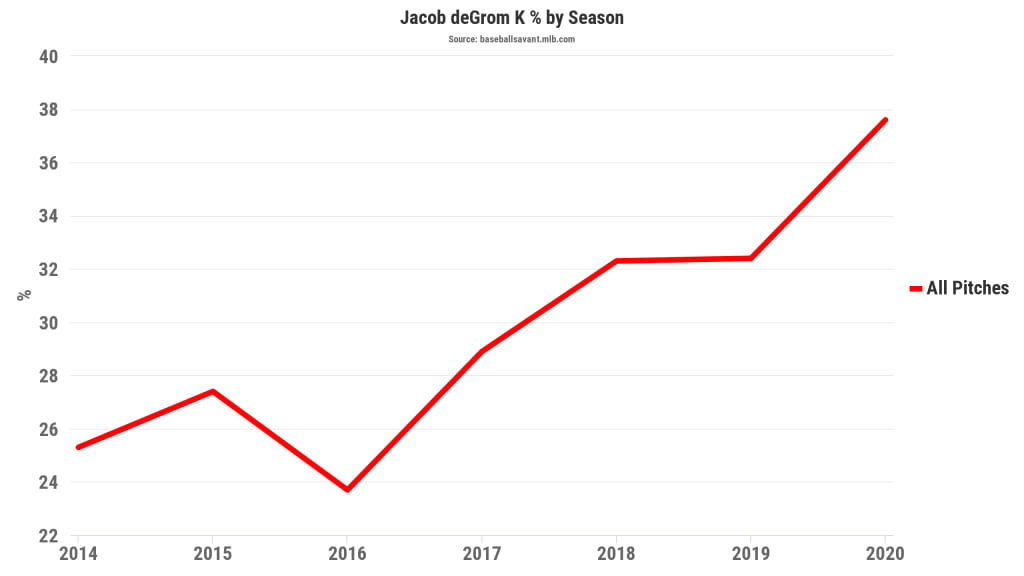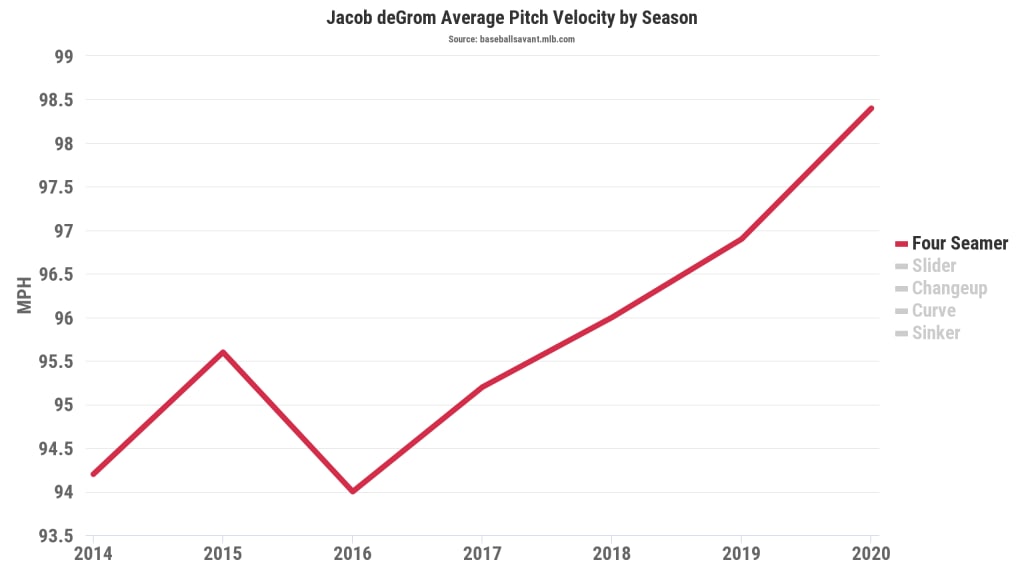Jacob deGrom, who starts on Friday night against the Blue Jays in Buffalo, N.Y., is likely to get four more starts this year. That would give him an even dozen in this truncated season. He has a 1.69 ERA. You can guess where this is going.
It feels weird, to be sure, to be thinking about end-of-season awards, considering the season began only seven weeks ago, which would put us somewhere near mid-May in a normal year. But this is where we find ourselves, because this is anything but a "normal" year. deGrom has once again been absolutely fantastic, and in less than three weeks, baseball writers will be casting their ballots for seasonal awards.
deGrom, the 2014 NL Rookie of the Year, won the NL Cy in 2018, and he won it again in 2019, each time collecting 29 of 30 first-place votes. Can he win it again in 2020? And if he does ... what does that mean, historically?
1) Can deGrom win a third straight Cy Young?
Short answer: Sure!
Longer answer: Well, it's certainly possible.
For the purposes of this discussion, we're going to say there's something like a four-way tie at the top of this race: deGrom, Yu Darvish, Trevor Bauer and Corbin Burnes.
"What about ..." you ask. Max Fried? He's been excellent, but he's injured, after experiencing a disturbing velocity drop. Clayton Kershaw and his 1.98 ERA? Also excellent, but he's lacking in innings due to not making his first start until Aug. 2; he currently doesn't appear on the "qualified" leaderboard. Dinelson Lamet? Aaron Nola? Zac Gallen? Max Scherzer? Devin Williams? Zack Wheeler? Sonny Gray? On and on? All fantastic. It's hard to make a case for any of them ahead of our big four, at least among the metrics voters are likely to rely upon.
Let's stick with these four. Entering Friday, here's how their seasons look in a handful of important numbers. (We're not including win/loss record, because if deGrom has done anything while winning back to back Cys over the past two years while going 21-17, it's prove that voters just don't take this into account anymore.)
ERA
1.69 deGrom // 1.74 Bauer // 1.77 Darvish // 1.99 Burnes
Basically a three-way tie here, and this can change quickly. When Darvish allowed three earned runs in six innings on Wednesday, it pushed his ERA up from 1.44 to 1.77.
K%
38% deGrom // 36% Burnes // 36% Bauer // 34% Darvish
deGrom leads the NL in this, and he is second in the Majors only to Shane Bieber of Cleveland. Burnes and Bauer are directly behind.
Expected wOBA
(A Statcast metric that combines quality of contact + amount of contact)
.233 Bauer // .251 deGrom // .272 Darvish // .291 Burnes
We could also show Wins Above Replacement, but it's difficult to break apart much in a short season; when looking at the FanGraphs version, all are between 1.9 WAR and 2.2 WAR, which is to say "tied," because there's no meaningful difference in decimal points of WAR.
And that, mostly, is the point. Could deGrom win a third straight Cy? Sure. Or Bauer could win, or Darvish could, or Burnes, or someone like Nola or Fried or Kershaw could rip off three or four great starts in a row and change the complexion of the race. But the point here is, after eight starts over seven weeks of this shortened season, deGrom has done nothing at all to change his status as baseball's best pitcher, and if, when ballots are submitted three weeks from now, he's again at the top, it wouldn't be surprising. It's very possible.
He has, in fact, somehow kept getting better. In his last start, he collected 35 swinging strikes, tied for the most of any pitcher in any start since pitch tracking began back in 2008.
His strikeouts are up:

His velocity is up, and that's certainly not unrelated. (It is, however, an unexpected development for a 32-year-old pitcher. He is somehow only three months younger, to the day, than Kershaw is.)

His 49.5% ground-ball rate is a career high. He's allowing career lows in batting average (.177), on-base percentage (.226), and, it follows, OPS (.521). It's important to remember that doing this over 48 innings is not the same as doing it over 217 innings, as he did in 2018, or 204 innings, as he did last year. Then again, this isn't out of character, either. He pretty much always does this.
2) ... and what does it mean if he does?
Perhaps a little more interesting than wondering if he can win a third straight Cy (sure!) or if he will (maybe!) is what will happen if he does. Only 10 pitchers in Major League history have won a Cy three different times.
7 -- Roger Clemens
5 -- Randy Johnson
4 -- Steve Carlton
4 -- Greg Maddux
3 -- Sandy Koufax
3 -- Jim Palmer
3 -- Clayton Kershaw
3 -- Pedro Martínez
3 -- Max Scherzer
3 -- Tom Seaver
Of those 10 pitchers, seven are in the Hall of Fame, and every single one of them (Johnson, Carlton, Maddux, Koufax, Palmer, Martínez and Seaver) are inner-circle types who were elected on the first ballot. Two others (Kershaw, Scherzer) are still pitching and are all but guaranteed to be in Cooperstown someday. Clemens is clearly deserving based on his stats alone, though we hardly need to explain why he hasn't yet received the necessary votes.
Two Cy Youngs don't guarantee you a plaque in Cooperstown. Tim Lincecum won't get in, and Denny McLain, Bret Saberhagen and Johan Santana didn't either. But three? Not to mention three in a row, which only Maddux (1992-95) and Johnson (1999-02) have managed on their way to four straight? That would seem to be a slam dunk. Welcome to history, Mr. deGrom (if he wins this year's Cy).
Except ...
Remember when we said Kershaw was just three months older than deGrom, having been born in March 1988 ahead of deGrom's June '88 birthday?
Well, Kershaw has pitched in 354 games, piling up 2,315 2/3 innings. deGrom has only half the track record, getting in 179 games with 1,149 2/3 innings. That's because Kershaw was a highly touted first-round pick out of high school who was in the big leagues at age 20 ... while deGrom was a college shortstop who didn't reach the Majors until 26 and didn't make his first Opening Day roster until he was 27. Looking at some of his contemporaries, this is an unusual career path. Zack Greinke, like Kershaw, was up at 20. Stephen Strasburg was 21. Justin Verlander and Gerrit Cole debuted at 22; Scherzer at 23.
That he was something of a "late bloomer" is going to prevent deGrom from piling up the bulk numbers or massive counting stats that other great starters have had. He won't get to 300 wins, or even 200, really, or 3,000 strikeouts. He won't even be eligible until his 10th season, 2023, when he'll be 35 years old.
As MLB.com's Thomas Harrigan noted earlier this summer when he looked into this, a late-debut Hall of Famer is not unprecedented, though it hasn't exactly happened very often in the past few decades.
"Ten starting pitchers have been enshrined in Cooperstown after debuting in their age-25 season or later," Harrigan wrote. "Nine -- Old Hoss Radbourn, Joe McGinnity, Jack Chesbro, Eddie Plank, Mordecai Brown, Red Faber, Lefty Grove, Carl Hubbell and Bob Lemon -- debuted before integration. The other, Phil Niekro, was a knuckleballer who made his debut in 1964 and pitched until he was 48."
But let's play this out for a minute, for fun. Here's how deGrom's career numbers look in some big-picture stats:
Innings: 1,149 2/3
Games: 179
WAR: 33.5
ERA+: 151
Now, let's look at all starting pitchers who are currently in the Hall of Fame, trying to find those with the lowest totals in those numbers since 1901. (Emphasis on starting pitchers, not relievers like Mariano Rivera or Bruce Sutter. We'll also set aside Addie Joss, who pitched for Cleveland in the early 20th century and passed away two days after his 31st birthday.)
Innings: 1,967 1/3 (Dizzy Dean, 1930-47)
Games: 317 (Dean)
WAR: 32.8 (Bob Lemon, 1946-58)
ERA+: 103 (Rube Marquard, 1903-25)
So he has some work to do, clearly. (Again, we've set aside wins and losses. deGrom's 69-50 is hardly impressive, yet the electorate has already begun to change what stats they consider, and that is likely to only continue in the dozen more years or so it will take before he can be considered.)
Then again, those are deGrom's stats right now, and if he doesn't stay healthy and effective for several more years, then we're not having this conversation at all. If he remains very good for another year or two, and then solid enough for a few more after that, he'll get into more games than Dean and throw more innings too. Koufax, for example, threw 2,324 1/3 innings. deGrom could get there, or at least come close.
This all comes down to the fact that three Cys in a row, if he gets there, might allow for an elite peak to overcome a lack of bulk. It will come down to the fact that the Hall of Fame voters of the 2030s won't care about pitcher wins or raw strikeout totals. It will come down to the easy-to-make case that deGrom is far more dominant than Jack Morris, or Catfish Hunter, or some of the other lower-end members of the Hall.
(In some ways, this should also spur a closer look at the career of Johan Santana, another pitcher with a short career and a great peak, who "only" won two Cys but should have had a third. That he lost the 2005 race to Bartolo Colon was a clear mistake even 15 years ago, and it remains one of baseball's largest award injustices. Would a third have gained him entry, rather than a single year on the ballot with only 2.4% of the vote?)
Again: This all but requires deGrom wins the Cy this year, or next, or at least comes very close, and has a strong late-career push into his late 30s. It's not guaranteed. It's extremely possible. He is, after all, the best pitcher in baseball. He might yet end up being considered one of the best of all time.
